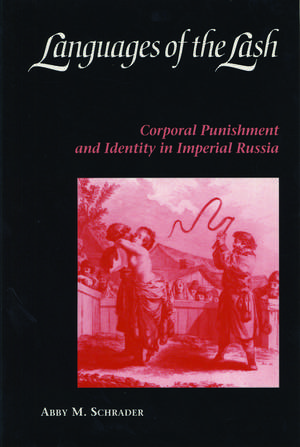Languages of the Lash: Corporal Punishment and Identity in Imperial Russia
Autor Abby M. Schraderen Limba Engleză Hardback – 31 mar 2002
Lashings, branding irons, and harsh treatment in labor camps all come to mind when one thinks of Russian methods of punishment. Analyzing the "languages of the lash"—the official definitions and discussions of corporal punishment—Schrader explores the relationship between the punishment of social deviants and the stability of the imperial Russian state. Interpreting penal law and practice in a broad social and political context, she illuminates the process by which Russia developed and reformulated corporal punishment from the era of Catherine the Great to the revolution of 1905.
In law and in practice, imperial Russian officials mapped and remapped society as they articulated various languages of punishment. One map was social: the lower classes were punished corporally while the nobility and educated members of society were exempt from corporal punishment. Another map was geographical, in that non-Russian ethnic groups and people exiled to Siberia were treated differently from those who lived in the Russian center. Biological differences constituted yet another map of society, as the young, the very old, women, and the infirm were regarded as weaker than able-bodied men and therefore less able to withstand corporal punishments.
Schrader's broad study enriches our understanding of the political, cultural, and social processes at work in Imperial Russia. Tracing penal reform over nearly two centuries, she challenges standard assumptions about Russian history and the roles of gender, the body, and ethnicity in political and cultural discourse.
In law and in practice, imperial Russian officials mapped and remapped society as they articulated various languages of punishment. One map was social: the lower classes were punished corporally while the nobility and educated members of society were exempt from corporal punishment. Another map was geographical, in that non-Russian ethnic groups and people exiled to Siberia were treated differently from those who lived in the Russian center. Biological differences constituted yet another map of society, as the young, the very old, women, and the infirm were regarded as weaker than able-bodied men and therefore less able to withstand corporal punishments.
Schrader's broad study enriches our understanding of the political, cultural, and social processes at work in Imperial Russia. Tracing penal reform over nearly two centuries, she challenges standard assumptions about Russian history and the roles of gender, the body, and ethnicity in political and cultural discourse.
Preț: 406.01 lei
Nou
Puncte Express: 609
Preț estimativ în valută:
77.69€ • 80.15$ • 64.83£
77.69€ • 80.15$ • 64.83£
Carte tipărită la comandă
Livrare economică 26 martie-09 aprilie
Preluare comenzi: 021 569.72.76
Specificații
ISBN-13: 9780875802893
ISBN-10: 0875802893
Pagini: 271
Dimensiuni: 152 x 229 x 25 mm
Greutate: 0.59 kg
Ediția:1
Editura: Northern Illinois University Press
Colecția Northern Illinois University Press
ISBN-10: 0875802893
Pagini: 271
Dimensiuni: 152 x 229 x 25 mm
Greutate: 0.59 kg
Ediția:1
Editura: Northern Illinois University Press
Colecția Northern Illinois University Press
Recenzii
"Valuable and original."—Elise Kimerling Wirtschafter, author of Social Identity in Imperial Russia
Notă biografică
Abby M. Schrader is Assistant Professor of History at Franklin & Marshall College in Lancaster, Pennsylvania.
Cuprins
Table of Contents
Acknowledgments
Introduction
1. Law and the Languages of Punishment
2. Containing the Spectacle of Punishment
3. Constructing Imperial Others: Penal Legislation in the Borderlands
4. Branding the Exile as Other: Punishment in the Siberian Penal System
5. Bodies on the Margin: Penal Law and the Languages of Physiological Difference
6. The Great Reform of Corporal Punishment and Its Limits, 1855-1867
Conclusion Notes
Bibliography
Index
Introduction
1. Law and the Languages of Punishment
2. Containing the Spectacle of Punishment
3. Constructing Imperial Others: Penal Legislation in the Borderlands
4. Branding the Exile as Other: Punishment in the Siberian Penal System
5. Bodies on the Margin: Penal Law and the Languages of Physiological Difference
6. The Great Reform of Corporal Punishment and Its Limits, 1855-1867
Conclusion Notes
Bibliography
Index
Descriere
Lashings, branding irons, and harsh treatment in labor camps all come to mind when one thinks of Russian methods of punishment. Analyzing the "languages of the lash"—the official definitions and discussions of corporal punishment—Schrader explores the relationship between the punishment of social deviants and the stability of the imperial Russian state. Interpreting penal law and practice in a broad social and political context, she illuminates the process by which Russia developed and reformulated corporal punishment from the era of Catherine the Great to the revolution of 1905.
In law and in practice, imperial Russian officials mapped and remapped society as they articulated various languages of punishment. One map was social: the lower classes were punished corporally while the nobility and educated members of society were exempt from corporal punishment. Another map was geographical, in that non-Russian ethnic groups and people exiled to Siberia were treated differently from those who lived in the Russian center. Biological differences constituted yet another map of society, as the young, the very old, women, and the infirm were regarded as weaker than able-bodied men and therefore less able to withstand corporal punishments.
Schrader's broad study enriches our understanding of the political, cultural, and social processes at work in Imperial Russia. Tracing penal reform over nearly two centuries, she challenges standard assumptions about Russian history and the roles of gender, the body, and ethnicity in political and cultural discourse.
In law and in practice, imperial Russian officials mapped and remapped society as they articulated various languages of punishment. One map was social: the lower classes were punished corporally while the nobility and educated members of society were exempt from corporal punishment. Another map was geographical, in that non-Russian ethnic groups and people exiled to Siberia were treated differently from those who lived in the Russian center. Biological differences constituted yet another map of society, as the young, the very old, women, and the infirm were regarded as weaker than able-bodied men and therefore less able to withstand corporal punishments.
Schrader's broad study enriches our understanding of the political, cultural, and social processes at work in Imperial Russia. Tracing penal reform over nearly two centuries, she challenges standard assumptions about Russian history and the roles of gender, the body, and ethnicity in political and cultural discourse.








